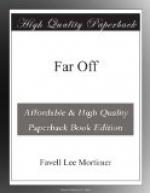The king’s palace is called the “Ark,” and is a very strong as well as grand place.[5]
[5] Extracted chiefly from Southgate’s Travels.
CHINA.
There is no country in the world like China.
How different it is from Persia, where there are so few people; whereas China is crowded with inhabitants!
How different it is from England, where the people are instructed in the Bible, whereas China is full of idols.
China is a heathen country; yet it is not a savage country, for the people are quiet, and orderly, and industrious.
It would be hard for a child to imagine what a great multitude of people there are in China.
If you were to sit by a clock, and if all the Chinese were to pass before you one at a time, and if you were to count one at each tick of the clock, and if you were never to leave off counting day or night—how long do you think it would be before you had counted all the Chinese?
Twelve years. O what a vast number of people there must be in China! In all, there are about three hundred and sixty millions! If all the people in the world were collected together, out of every three one would be a Chinese. How sad it is to think that this immense nation knows not God, nor his glorious Son!
There are too many people in China, for there is not food enough for them all; and many are half-starved.
FOOD.—The poor can get nothing but rice to eat and water to drink; except now and then they mix a little pork or salt fish with their rice. Any sort of meat is thought good; even a hash of rats and snakes, or a mince of earth-worms. Cats and dogs’ flesh are considered as nice as pork, and cost as much.
An Englishman was once dining with a Chinaman, and he wished to know what sort of meat was on his plate. But he was not able to speak Chinese. How then could he ask? He thought of a way. Looking first at his plate, and then at the Chinaman, he said, “Ba-a-a,” meaning to ask, “Is this mutton?” The Chinaman understood the question, and immediately replied, “Bow-wow,” meaning to say, “It is puppy-dog.” You will wish to know whether the Englishman went on eating; but I cannot tell you this.
While the poor are in want of food, the rich eat a great deal too much. A Chinese feast in a rich man’s house lasts for hours. The servants bring in one course after another, till a stranger wonders when the last course will come. The food is served up in a curious way; not on dishes, but in small basins—for all the meats are swimming in broth. Instead of a knife and fork, each person has a pair of chop-sticks, which are something like knitting-needles; and with these he cleverly fishes up the floating morsels, and pops them into his mouth. There are spoons of china for drinking the broth.
You will be surprised to hear that the Chinese are very fond of eating birds’ nests. Do not suppose that they eat magpies’ nests, which are made of clay and sticks, or even little nests of moss and clay; the nests they eat are made of a sort of gum. This gum comes out of the bird’s mouth, and is shining and transparent, and the nest sticks fast to the rock. These nests are something like our jelly, and must be very nourishing.




